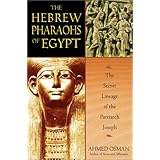
Average Reviews:

(More customer reviews)I was intrigued by the thesis of this book; that the roots of both Judaism and Christianity were to be found in ancient Egypt. Amongst other ideas, the author suggests that the Pharaohs Thutmosis III, Akhenaten, and Tutankamun were the persons that the Bible calls David, Moses, and Jesus, respectively. He argues that the accounts in the scriptures held sacred by the Jews and by Christians, known as the Old Testament, and which were written down only after many centuries of oral tradition, are seriously flawed and ahistorical. Osman further suggests that there is no proof whatsoever, aside from the biblical account, that there ever was an important Jewish kingdom in Palestine ruled by David or Solomon. Essentially, he contends that Jesus did not live a mortal life in the first century AD, but rather that embellished accounts of a life from more than 1000 years earlier were used as a model in what amounted to a great deception. His book is a serious problem for either a believing Christian or a believing Jew, undercutting as it does the veracity of the scriptures, and basic tenets of both faiths. Nonetheless, the book might be a serious challenge to conventional scholarship, were it not flawed itself. Osman has an annoying and ultimately self-undermining habit of making a great many unsupported suppositions. He makes a claim, which he promises to prove "later", and then later he continues his argument with "As we have seen..." as though he has offered solid proof, when in fact he has offered nothing of the sort. There is far too much here that lacks substantiation, and the author relies far too heavily on the Bible itself (which he himself claims is completely unreliable) and his personal interpretation thereof, to measure up to even a weak academic standard. It IS an entertaining read; but far too many speculations are held together with very little solid evidence for Osman's argument to be taken completely seriously. Even his research was less than thorough. His bibliography, for example, does not include Immanuel Velikovsky, who wrote of a similar theory regarding the Pharaoh Akhenaten decades ago. To conclude, the book promised much, but failed to deliver. Ultimately, I was disappointed.
Click Here to see more reviews about: Out of Egypt: The Roots of Christianity Revealed
Click here for more information about Out of Egypt: The Roots of Christianity Revealed




